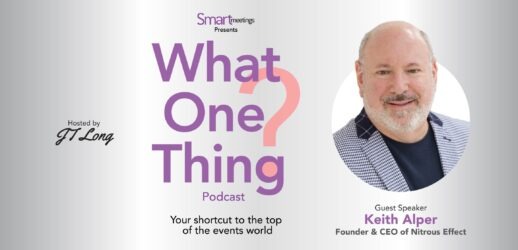Banish manic-tasking in yourself and your audiences
Editor’s Note: The following is an excerpt from the book “Attention Pays: How to Drive Profitability, Productivity and Accountability” by Neen James, who will be speaking at Smart Meetings Extraordinary Florida Experience in August at PGA National Resort, Palm Beach.
In our modern world, the number of things that demand our attention has dramatically increased. We are being pulled in so many different directions and being asked to produce better results faster and with fewer resources. Our solution has been to multitask or manic-task, as I call it. I’ve been guilty of this—frantically switching between screens, paper, calls and to-do lists in an attempt to get it all done.
For years, we’ve been told that multitasking was the way to be more efficient and productive. Too bad it’s not true. The reality is we are multitasking more yet achieving less. We are busy, but not productive. We still feel like we can’t get it all done. Don’t you feel that? And it’s stressful, right?
Our Attention-deficit Society
The idea that multitasking will help us get more done is a myth. As a result of numerous studies and neuroscience research, we now know that the brain is incapable of performing multiple tasks simultaneously (yes, including talking and texting). Rather than multitasking, the brain is rapidly shifting from one task to another. And each time the brain switches tasks, it has to go through a start-stop-start process. Some estimates suggest that productivity goes down by as much as 40% to 50% when we task switch. Other studies have found that because this task switching increases the cognitive load on our brains, it also increases the chances of making mistakes and missing important information and cues, as well as hinders problem-solving and creativity.
Read More: Healthy You: Pay Attention
In his book “Free,” Chris Anderson, founder of TED Talks and editor-in-chief of Wired magazine, asked the reader, “Does multitasking just slice the same attention more finely?” The answer is, yes. We are splitting our attention in many different directions, giving a piece of our attention here, a piece there, and another piece over there. As a result, nothing is getting our true attention and everything is getting short-changed. We need to replace our manic-tasking with single-tasking or sane-tasking, as I call it—staying sane while focusing our attention on the important conversation, proposal, or project at hand until it is completed. Which do you do more of—manic-tasking or sane-tasking?
The “Over Trilogy”—Overwhelmed, Overstressed, and Overtired
As a meeting professional, I imagine you are a high achiever. You want more, you hustle, you want to be at the top. But that leads to a dangerous condition of feeling overwhelmed, overstressed, and overtired, The Over Trilogy. We feel constantly overwhelmed as our responsibilities at work and at home continue to grow. We attempt to answer emails between meetings, eat on the run, live on protein bars, respond to the boss, and then look after our family. We want so much more in life, but we don’t know where to begin.
“It’s time to punch Chip in the face, tell him he’s not welcome, and decide that you are done being overwhelmed, overstressed and overtired.”
You are not alone. A recent study conducted by the American Psychological Association found that average stress levels in the United States rose yet again from 4.9 to 5.1 on a 10-point stress scale. In addition, 24% of adults reported being extremely stressed, compared to 18% a year earlier. Chronic stress impairs our ability to shift our attention. A 2009 study of stressed-out medical students found that stress affects the attention-regulating area of the prefrontal cortex of the brain.
Read More: Four Quick Ways to De-stress During Meeting Crunch Time
The Silent Killer
Stress is a silent killer. We can’t see it or touch it or smell it. But we can see the impacts of it. Chronic stress is linked to the six leading causes of death (heart disease, cancer, lung ailments, accidents, cirrhosis of the liver, and suicide), and more than 75% of all physician office visits are for stress-related ailments and complaints.
I often refer to the overwhelm and overstress combination as Chip, like a chip on your shoulder, a gremlin who visits late at night. He taunts you relentlessly, reminding you of everything you didn’t get done today. It’s time to punch Chip in the face, tell him he’s not welcome, and decide that you are done being overwhelmed, overstressed and overtired. It’s no way to live. Instead, choose to live a meaningful life filled with significant moments.
This article appears in the June 2023 issue. You can subscribe to the magazine here.




